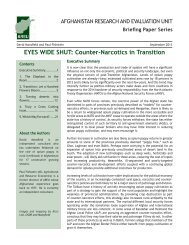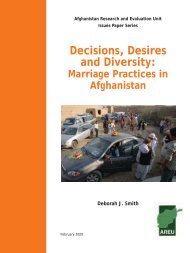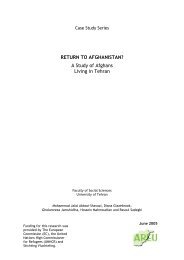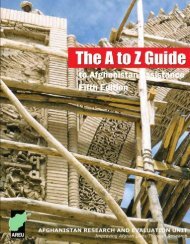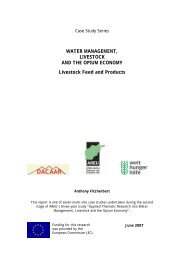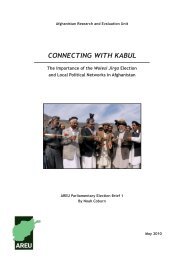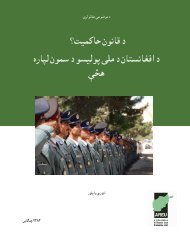Local Governance in Afghanistan: A View from the Ground
Local Governance in Afghanistan: A View from the Ground
Local Governance in Afghanistan: A View from the Ground
- No tags were found...
Create successful ePaper yourself
Turn your PDF publications into a flip-book with our unique Google optimized e-Paper software.
<strong>Afghanistan</strong> Research and Evaluation Unit<br />
2011<br />
i-Wahadat factions, and that both parties were structured around <strong>in</strong>dividuals. This fragmentation of<br />
political parties around <strong>in</strong>dividual leadership was <strong>in</strong>dicative of <strong>the</strong> fractious nature of Hazara politics.<br />
In multi-ethnic prov<strong>in</strong>ces such as Samangan, political choices are reflected <strong>in</strong> shift<strong>in</strong>g allegiances<br />
and alliances of convenience. Former jihadi commanders have often undergone multiple changes of<br />
political allegiance. Though most have now lost <strong>the</strong>ir <strong>in</strong>fluence, only a few lead sedentary lives as<br />
village elders, advis<strong>in</strong>g CDCs on development projects or discuss<strong>in</strong>g priorities with NSP facilitat<strong>in</strong>g<br />
partners. Instead, a sizeable number of former commanders now spend of <strong>the</strong>ir time look<strong>in</strong>g after<br />
<strong>the</strong>ir bus<strong>in</strong>esses.<br />
Of all <strong>the</strong> factors that have led to <strong>the</strong> underm<strong>in</strong><strong>in</strong>g of political party structures <strong>in</strong> <strong>Afghanistan</strong>, SNTV<br />
has probably been <strong>the</strong> most significant. Through <strong>in</strong>hibit<strong>in</strong>g party formation, it fails to recognise how<br />
political parties can be a means to mobilise public action and br<strong>in</strong>g about change. The impact that<br />
this power of mobilisation—or its lack—can have is amply demonstrated <strong>in</strong> political events <strong>in</strong> Jawzjan<br />
prov<strong>in</strong>ce over <strong>the</strong> past few years. In 2007, a demonstration was organised <strong>in</strong> Jawzjan aga<strong>in</strong>st <strong>the</strong><br />
<strong>in</strong>cumbent Wali Juma Khan Hamdard by members of <strong>the</strong> youth w<strong>in</strong>g of Junbesh-i-Milli. Events took<br />
a hostile turn when 10 people were killed and 45 <strong>in</strong>jured <strong>in</strong> ANP gunfire. In response, <strong>the</strong> Junbeshi<br />
Youth Council registered compla<strong>in</strong>ts with ISAF, <strong>the</strong> PRT and <strong>the</strong> government and though no formal<br />
<strong>in</strong>vestigation was carried out, Hamdard was replaced. This was <strong>in</strong> stark contrast to <strong>the</strong> muted protests<br />
that followed <strong>the</strong> removal of <strong>the</strong> Turkmen Wali Roz Mohammad Nur <strong>in</strong> 2005 <strong>in</strong> what was widely<br />
believed to be a deal between Karzai and General Dostum, <strong>the</strong> de facto leader 99 of Junbesh and <strong>the</strong><br />
Uzbeks. 100 S<strong>in</strong>ce <strong>the</strong>n, Turkmens have rallied at various times for political power <strong>in</strong> Jawzjan—first<br />
by nom<strong>in</strong>at<strong>in</strong>g candidates <strong>in</strong> <strong>the</strong> Wolesi Jirga and prov<strong>in</strong>cial council elections and <strong>the</strong>n by operat<strong>in</strong>g<br />
through civil society organisations. However, <strong>the</strong>y have never been able to mobilise <strong>the</strong>mselves to<br />
form an effective challenge to Junbesh dom<strong>in</strong>ance. The Turkmen vote for both Wolesi Jirga and<br />
prov<strong>in</strong>cial council elections was diluted when Junbesh cajoled or bribed several Turkmen candidates<br />
to stand even though <strong>the</strong>y had no hope of w<strong>in</strong>n<strong>in</strong>g. Grow<strong>in</strong>g Turkmen resentment has s<strong>in</strong>ce crept <strong>in</strong>to<br />
all aspects of public life. Few Turkmens have been able to enter Jawzjan University, and <strong>the</strong> Turkmen<br />
populations of Qarq<strong>in</strong> and Khamyab Districts are particularly marg<strong>in</strong>alised. Turkmens <strong>in</strong> Jawzjan have<br />
gravitated towards Jamiat-i-Islami after it opened an office <strong>in</strong> <strong>the</strong> prov<strong>in</strong>cial capital of Sheberghan<br />
<strong>in</strong> 2009, a development that clearly shows <strong>the</strong> potentially important role a political party can play <strong>in</strong><br />
allow<strong>in</strong>g voice to marg<strong>in</strong>alised communities.<br />
The demand for a greater space for political parties to operate <strong>in</strong> is <strong>in</strong>creas<strong>in</strong>g across <strong>the</strong> study<br />
prov<strong>in</strong>ces, despite <strong>the</strong> limitations of SNTV. Campaign<strong>in</strong>g has become expensive, and <strong>the</strong> cost of<br />
practices such as distribut<strong>in</strong>g gifts among supporters is mak<strong>in</strong>g it harder to seek election without<br />
access to substantial f<strong>in</strong>ancial resources. 101 As such, it is becom<strong>in</strong>g <strong>in</strong>creas<strong>in</strong>gly difficult to ga<strong>in</strong><br />
election to <strong>the</strong> Wolesi Jirga or prov<strong>in</strong>cial councils as an <strong>in</strong>dependent candidate. For example, <strong>in</strong><br />
<strong>the</strong> 2009 prov<strong>in</strong>cial council elections, only two <strong>in</strong>dependents were elected <strong>in</strong> Samangan and <strong>in</strong><br />
Laghman, with none <strong>in</strong> Day Kundi. Those who failed to ga<strong>in</strong> re-election <strong>in</strong> 2009 promptly declared<br />
<strong>the</strong>ir affiliation and registered with political parties.<br />
While jo<strong>in</strong><strong>in</strong>g political parties may for some be driven by a desire to access power or resources,<br />
for women party membership also opened an avenue for greater engagement <strong>in</strong> public life. In<br />
Wardak, a women-centric political group—Milli Khowazakht—has emerged, call<strong>in</strong>g for adm<strong>in</strong>istrative<br />
decentralisation, equal rights for women, and better treatment and opportunities for <strong>the</strong> families<br />
of martyrs. Though parties such as this might seem <strong>in</strong>significant <strong>in</strong> <strong>the</strong> larger scene, <strong>the</strong>ir existence<br />
99 The official leader of Jumbesh-i-Milli Islami <strong>Afghanistan</strong> is Sayed Noorullah. Abdul Rashid Dostum gave up his leadership<br />
to take up <strong>the</strong> position of Defence M<strong>in</strong>ister of <strong>Afghanistan</strong> <strong>in</strong> 2004. Though Dostum now divides his time between Jawzjan and<br />
Turkey, he is still very <strong>in</strong>fluential and rema<strong>in</strong>s popular among <strong>the</strong> Uzbeks.<br />
100 The removal of <strong>the</strong> Turkmen prov<strong>in</strong>cial governor is one of many examples of <strong>the</strong> disenfranchisement of <strong>the</strong> Turkmens<br />
and consolidation of power by Junbesh. For an <strong>in</strong>sight <strong>in</strong>to what caused Jumbesh to develop <strong>in</strong>to an almost exclusively Uzbek<br />
party, see: Antonio Giustozzi, “The Ethnicisation of an Afghan Faction: Junbesh-i-Milli <strong>from</strong> its Orig<strong>in</strong>s to <strong>the</strong> Presidential<br />
Elections,” Crisis States Work<strong>in</strong>g Papers (Series 1) 67 (London: Crisis States Research Centre, LSE, 2005).<br />
101 For more on this phenomenon <strong>in</strong> <strong>the</strong> context of <strong>the</strong> Wolesi Jirga see: Noah Coburn, “Political Economy of <strong>the</strong> Wolesi<br />
Jirga: Sources of F<strong>in</strong>ance and <strong>the</strong>ir Impact on Representation <strong>in</strong> <strong>Afghanistan</strong>’s Parliament” (Kabul: <strong>Afghanistan</strong> Research and<br />
Evaluation Unit, 2011).<br />
<strong>Local</strong> <strong>Governance</strong> <strong>in</strong> <strong>Afghanistan</strong>: A <strong>View</strong> <strong>from</strong> <strong>the</strong> <strong>Ground</strong><br />
48



